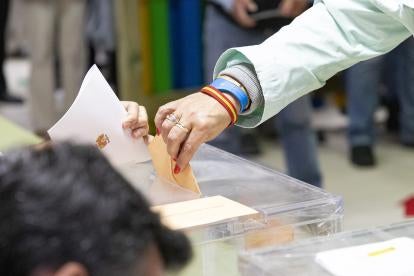On November 30, Michigan Governor Gretchen Whitmer signed into law several bills intended to protect voting rights and improve election procedures across the state. In November 2022, Michigan voters overwhelmingly approved Proposal 2022-2 (“Prop 2”), which enshrined certain voting rights in Michigan’s Constitution. Since the addition of Prop 2 to the state constitution, Michigan’s legislature has continued to enact even more sweeping changes in election administration.
Some of the most notable bills signed by Governor Whitmer this week involve greater protections for election workers and election officials and further guidance regarding the election certification process that became a media fixture during the 2020 presidential election. Additional bills address obstacles in existing voter registration procedures and growing concerns about the use of artificial intelligence in Michigan election advertising. The Governor's office has highlighted significant changes effected by the bills, including:
Protection for Election Workers and Officials
- HB 4129 makes it a crime to prevent an election official from performing their duties or to intimidate an election official because of their status as an election official with the specific intent to interfere with the official’s duties. SB 505 makes engaging in activity that would prevent or prohibit election workers from doing their jobs a felony punishable by up to five years imprisonment.
Election Certification
- SB 529 updates the election canvassing and certification process to conform to the federal Electoral Count Reform Act. The bill specifies how the governor must issue a certificate of ascertainment containing the results of a presidential election and requires results to be transmitted to the U.S. Archivist by the most expeditious method available. The bill also protects eligible voters from having their ballots rejected because of mistakes made by election officials.
- SB 590 & SB 591 clarify the process and grounds to contest elections in court. The Michigan Supreme Court would have original and exclusive jurisdiction to consider a complaint for an alleged error in the board of state canvassers’ certification of a presidential election, and there are deadlines for when the court’s final order would be due. Additionally, private persons would be prohibited from bringing an action for quo warranto to any challenge that relates to the office of the presidential and vice-presidential electors.
- SB 570 prohibits a county clerk from conducting an election audit if the clerk is an officer, member, or precinct delegate of a political party. Instead, the county clerk must appoint a designee who is not similarly disqualified.
Election Efficiency
- SB 385 allows Michigan residents to apply online to become election inspectors and is expected save counties, cities, and townships money on paperwork.
- HB 4569 allows Michigan residents between the ages of 16 and 17 and a half to preregister to vote. Young people who preregister to vote will automatically become registered voters when they reach 17 and a half years of age and will be eligible to vote in elections occurring after they are 18 years of age.
Voter Registration
- SB 594 expands online voter registration options by allowing Michigan residents to register to vote using the last four digits of their social security number. The new identity verification replaces a requirement that registrants have a Michigan driver’s license or state-issued identification card. The bill will take effect June 30, 2025.
- HBs 4983, 4984, 4985, and 4986 further expand Michigan’s automatic voter registration process.
- Under current law, the Secretary of State is required to register any person who applies for a Michigan driver’s license or ID card who is eligible to register to vote. HB 4983 requires the Secretary to send that applicant a notice of registration along with information about absentee voting and instructions on how to decline that registration. The bill also provides that the Secretary may designate a state agency as an automatic voter registration agency if the agency routinely collects information from individuals that would confirm their eligibility to register to vote. Other state agencies and Indian tribes have additional duties and powers under the now-law that are expected to increase the efficiency of automatic registration.
- HBs 4984, 4985, and 4986 clarify the process by which individuals may decline their automatic registration. The bills will take effect June 30, 2025.
Artificial Intelligence
- HB 5141 generally requires political advertisements generated using artificial intelligence to disclose that the advertisement was generated by artificial intelligence, and HB 5143 defines “artificial intelligence” under the Michigan Campaign Finance Act as a machine-based system that can make predictions, recommendations, or decisions influencing real or virtual environments for a given set of human-defined objectives and that uses machine and human-based inputs.
- HB 5144 makes it a crime to knowingly distribute materially deceptive media generated by artificial intelligence if done with the intent of harming the reputation or electoral prospects of a candidate in an election occurring within 90 days. The bill also forbids deceiving voters into falsely believing that a depicted individual engaged in fake speech or conduct. HB 5145 provides sentencing guidelines for individuals who violate HB 5144 more than once within five years.






 i
i


